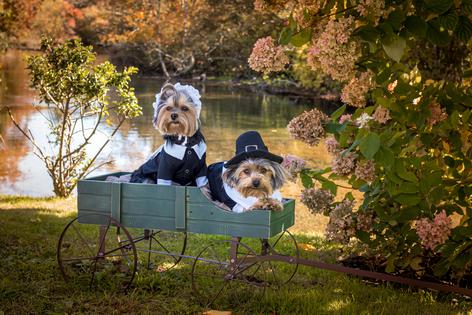My Pet World: A seasonal thank you to our pets
This year, as you count your blessings, why not take a moment to include the dogs, cats, birds and other pets who share your life?
They remind us every day of what gratitude truly looks like – unconditional love, quiet companionship, and joy in simply being by our side.
But while the holidays bring joy to us, they can also bring hazards for our pets. From rich foods and open doors to loud guests and tempting trash. Thanksgiving can be overwhelming or even dangerous for animals if we’re not careful.
Here are a few simple ways to keep your dogs, cats, and birds safe and comfortable this holiday season:
When it comes to dogs, those pleading eyes can be hard to resist. But Holiday foods are far too rich for dogs. Fatty dishes like gravy, turkey skin, stuffing, and casseroles can upset their stomachs or even trigger pancreatitis, a painful and potentially life-threatening condition.
If you want to share a taste of the holidays, offer only a small piece of plain, cooked, unseasoned turkey with no skin, bones, or seasonings. You can even add a spoonful of plain pumpkin (from a can, not from the pie filling or the pie itself) to their regular meal for a safe seasonal touch. Avoid sharing any foods that are toxic to dogs, including chocolate, onions, garlic, grapes, raisins, yeast dough, alcohol, and artificial sweeteners like xylitol (commonly found in sugar-free gum, candy, and some peanut butters). Even small amounts of these foods can cause severe illness.
With dogs, keep trash cans tightly closed, especially after dinner. Dogs are experts at sniffing out scraps, and things like turkey bones, skewers, twine, and foil can cause choking or intestinal blockages if swallowed. Consider taking the trash directly outside once cleanup begins.
If your dog gets overwhelmed by guests, noise, or the chaos in the kitchen, give them a quiet retreat – a bedroom with their bed, water, and a favorite toy. A few minutes of calm away from the crowd can help them relax and prevent anxious behavior like barking, pacing, or counter-surfing.
And remember, many veterinary clinics are closed on holidays, so a sudden stomach upset or bone blockage could mean an expensive trip to the emergency vet. Prevention truly is the best medicine on holidays.
Cats are often less obvious about their curiosity, but that doesn’t mean they’re less likely to get into trouble. Many holiday staples are toxic to cats, including onions, garlic, raisins, grapes, chocolate, and alcohol. Turkey bones, string, and small decorations like twist ties or ribbons can also pose serious hazards if swallowed. While you’re prepping or serving food, keep cats off counters and tables. Discourage them from licking plates, and like with dogs, resist the urge to give them leftovers.
If your cat tends to dash for the door when guests arrive, consider keeping them in a safe, closed room while people are coming and going. Provide them with their litter box, food, water, and a cozy spot to hide.
Pet birds require special attention around holidays because their respiratory systems are extremely sensitive. Nonstick cookware, self-cleaning oven fumes, and aerosol sprays can all release odorless but deadly fumes that can kill a bird within minutes. Always keep birds in a well-ventilated area far from the kitchen while cooking and never use nonstick or Teflon-coated pans around them.
Avoid feeding birds any salty, sugary, or seasoned foods. Human food can quickly upset their small digestive systems. Offer a tiny bite of plain, cooked sweet potato, pumpkin, green beans, or apple instead. These are safe, vitamin-rich snacks that make them feel included without the risk.
If your home gets loud, move your bird’s cage to a quieter space or partially cover it with a light cloth to help them feel secure. Birds are easily startled by sudden movement and loud laughter, and even well-meaning guests can unintentionally frighten them.
Finally, remind your guests about the house rules when it comes to your pets. Well-meaning dinner guests have been known to sneak a bite of turkey or stuffing to a nearby dog (and don’t be this guest in someone else’s home.) A little honesty and humor go a long way here: Let them know that your pets are on a strict “no table scraps” policy for their own safety.
Pets thrive on predictability, so while we’re enjoying the feast and festivities, try to feed and give them playtime around the same times as usual, and give them a quiet place to retreat to when the house gets busy.
This helps reduce stress and prevents behavior issues that can come from disrupted schedules.
_____
_____
========
(Cathy M. Rosenthal is a longtime animal advocate, author, columnist and pet expert who has more than 25 years in the animal welfare field. Send your pet questions, stories and tips to cathy@petpundit.com. Please include your name, city, and state. You can follow her @cathymrosenthal.)
©2025 Tribune Content Agency, LLC.
(c) 2025 DISTRIBUTED BY TRIBUNE MEDIA SERVICES, INC.












Comments